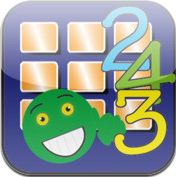 Eine weiter iPhone-App entwickelt von einem Studierenden an der TU Graz hat den Weg in den App Store geschafft: MatheMemory. Ein Spiel mit dem wir versuchen wollen Lernen (einfaches Addieren) und Freude (Memory) zu verbinden. Es gibt auch mehrere Schwierigkeitsstufen sowohl bei der Addition als auch bei der Anzahl der Karten. Wie immer freuen wir uns sehr über Feedback 🙂 .
Eine weiter iPhone-App entwickelt von einem Studierenden an der TU Graz hat den Weg in den App Store geschafft: MatheMemory. Ein Spiel mit dem wir versuchen wollen Lernen (einfaches Addieren) und Freude (Memory) zu verbinden. Es gibt auch mehrere Schwierigkeitsstufen sowohl bei der Addition als auch bei der Anzahl der Karten. Wie immer freuen wir uns sehr über Feedback 🙂 .
The MatheMemory App allows children to start learning mathematic playfully. Behind the memory cards with funny motifs hide tricky plus and minus calculations and results. The Goal is to find the right results to the according calculations. Different stages provide different levels of difficulty and balloons signal the number of cards. Both can be easily selected. Wether in the jungle or in the circus, nothing is blocking the funny calculating!
Depending on the level, the numbers are between 0 and 50. Addition and subtraction are used. Finding the right calculation and result pairs is rewarded with funny motifs and sounds and thus positive associated.
Hier kann die App downgeloadet werden [Link] und alle weiteren verfügbaren Apps der TU Graz findet man hier [iTunes Link].
